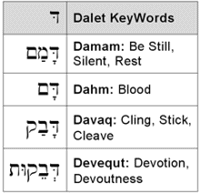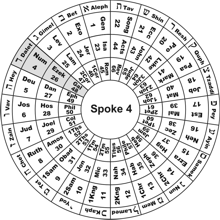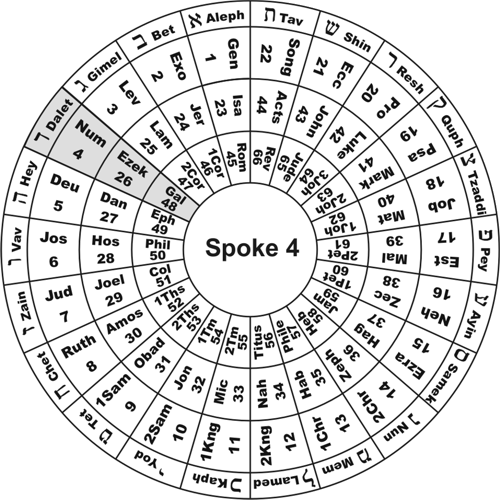The Fourth Commandment: Sabbath Rest
Remember the sabbath day, to keep it holy. Six days shalt thou labour, and do all thy work:
But the seventh day is the sabbath of the LORD thy God: in it thou shalt not do any work,
thou, nor thy son, nor thy daughter, thy manservant, nor thy maidservant, nor thy cattle, nor thy stranger
that is within thy gates: For in six days the LORD made heaven and earth, the sea, and all that in
them is, and rested the seventh day: wherefore the LORD blessed the sabbath day, and hallowed it.
Fourth Commandment (Exodus 20:8ff)
 The Fourth Commandment is the only temporal commandment, the only commandment dealing with time.
And since the sabbath was given as a sign (ot), it doubly links to the
Fourth Day when God set the time-keepers in the heavens "for signs,
and for seasons, and for days, and years." It corresponds to the fourth and central word in the seven words of Genesis 1:1
where we find the first occurrence of its cognate et,
the sign of the direct object (BW book pg 89).
God displayed the essential idea of the Sabbath in a Dalet Alphabetic Verse: The Fourth Commandment is the only temporal commandment, the only commandment dealing with time.
And since the sabbath was given as a sign (ot), it doubly links to the
Fourth Day when God set the time-keepers in the heavens "for signs,
and for seasons, and for days, and years." It corresponds to the fourth and central word in the seven words of Genesis 1:1
where we find the first occurrence of its cognate et,
the sign of the direct object (BW book pg 89).
God displayed the essential idea of the Sabbath in a Dalet Alphabetic Verse:
- AV Psalm 37:7 Rest (Damam) in the LORD, and wait patiently for him: fret not thyself because of him who prospereth
in his way (derek), because of the man who bringeth wicked devices to pass.
God presented the same correlation with the Number 4 in the chapter sequence of the Psalms, where this
KeyWord first appears in Psalm 4:4 "Stand in awe, and sin not:
commune with your own heart upon your bed, and be still (damam)."
For the Christian, the Sabbath is the prophetic prototype of the rest we have through the Work of Christ on the
fourfold cross - ✝ - when He shed His blood (dahm) to put an end to sin and declared "It is finished" (John 19:30).
He is our rest, He is our everlasting Sabbath, and He is the fulfillment of all the commandments of the Law.
The "x" marks the spot of our rest, and in the Wisdom of God this message is geometrically reiterated in the
"rest" displayed in the fourfold symmetry of the cross. The historical Jewish Sabbath,
set in the center of their temporal religious cycle (pg 46), was elevated by the Death of Christ and connected to
the Sabbath of God in Eternity. A Dalet verse in the great Alphabetic Psalm 119 teaches the
practical meaning of the Sabbath of Christ with the KeyWord davaq (cleave):
- AV Psalm 119:31 I have stuck (davaq) unto thy testimonies: O LORD, put me not to shame.
He used this word in conjunction with derek (way) when He reviewed the forty years in the wilderness spent preparing
for entrance into the Promised Land:
And the LORD said unto me, Arise, take thy journey before the people, that they may go
in and possess the land, which I sware unto their fathers to give unto them. And now, Israel, what doth the
LORD thy God require of thee, but to fear the LORD thy God, to walk in all his ways (derek), and to love him,
and to serve the LORD thy God with all thy heart and with all thy soul, To keep the commandments of the LORD,
and his statutes, which I command thee this day for thy good? ... Thou shalt fear the LORD thy God; him shalt thou
serve, and to him shalt thou cleave (davaq), and swear by his name. He is thy praise,
and he is thy God, that hath done for thee these great and terrible things, which thine eyes have seen.
Deuteronomy 10:11ff
He also used this word to describe the greatest king of Judah:
He trusted in the LORD God of Israel; so that after him was none like him among all the
kings of Judah, nor any that were before him. For he clave (davaq) to the LORD, and departed not
from following him, but kept his commandments, which the LORD commanded Moses.
2 Kings 18:5
This is the root of the noun devequt that Jews use to describe complete and utter devotion to
God. Only by cleaving – sticking, clinging, holding – to the Lord, can we abide in His Perfect Peace.
We must die to our own selves, cling to Him, and follow Him where ever He leads through the wilderness of this sinful
world. For we are weak (dal), but He is strong.
|



